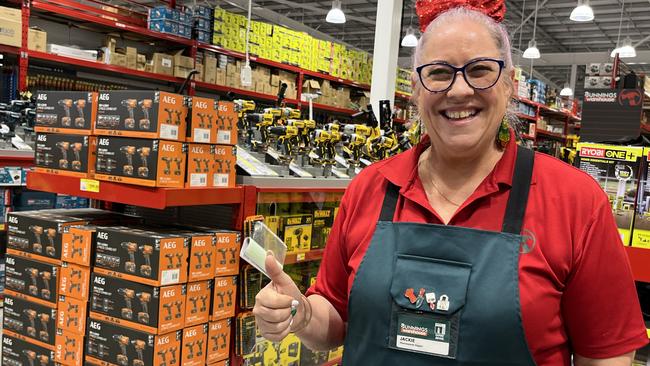
Both Dutton and Littleproud see a divestiture threat as akin to an atom bomb.
It is highly unlikely to be used because the threat it poses to large corporates will change their behaviours.
In politics, Dutton is deliberately leading the Liberals into a new era by ending the days when the party were closely aligned with large corporations.
There is still a relationship, but on an increasing number of issues large Australian corporates are becoming the third side of a power triangle where the other two sides are their large shareholders (big superannuation funds) and the ALP/unions.
The power triangle was used to attack the Coalition in the Aboriginal referendum when the large corporations funded the ALP attack on Dutton and Littleproud.
Woolworths, Bunnings’ owner Wesfarmers and Coles were among those who joined the attack on the Coalition.
Large companies will use the triangle to modify the blows of the industrial relations legislation. Medium-sized and smaller enterprises are in more danger.
The Coalition now aims to be the party of “the forgotten” — middle sized and small businesses and their employees — who are suffering cost of living pressures, including those engineered by the power triangle.
While most of the current emphasis has been on potentially breaking the two big supermarkets’ pricing power, the prospect of Bunnings dominating the distribution of both retail and trade building products may generate more future issues.
In the traditional home of capitalism, the United States, the break-up weapon has been used at least twice.
Between 1899 and 1911, John D Rockefeller’s Standard Oil company operated a near monopoly in the American oil industry and was the largest corporation in the US.
The Supreme Court ordered a break-up. However, the remaining Standard Oil New Jersey company (now Exxon) remains powerful.
Until 1982, AT&T had a near monopoly of US telecommunications. The break-up efforts started in 1972 and finally AT&T, realising it was about to lose, proposed a split formula which was accepted by the courts.
In Australia, Bunnings is the nearest to the two US examples.
Just over 30 years ago Bunnings was basically a WA hardware operation with Wesfarmers as its major shareholder.

Bunnings purchased McEwan’s in Melbourne from the administrator for just $48m. McEwan’s senior executives had a plan, which when combined with Wesfarmers capital and Bunnings own plans saw the launch of the now well-known Bunnings large stores.
The major established hardware retailers on the east coast foolishly did not respond to the Bunnings initiative.
But, the Bunnings strategy was right, and it now dominates the do-it-yourself hardware market. It was a superb operation, interrupted only by a failed attempt to do the same thing in the UK.
Woolworths tried to challenge Bunnings in retail but didn’t have Bunnings’ management skills and the ill-fated Woolworths’ thrust propelled Bunnings even faster.
Bunnings is now using the power it derives from its dominance of the retail sector to attack the trade sector.
In addition, one of its weapons is its ability to make its own trusses in most states and offer major builders an attractive total supply contract with low-priced trusses as a lynch pin.
Unless the smaller rivals can match, the builders will have little choice but to accept the Bunnings offer.
The power of this marketing and supply chain operation will over time severely damage or wipe out most of the Bunnings’ competitors in the trade area.
Bunnings will then dominate both sectors and the total Australian building supply industry. This full control of the market, of course, as the US found with Standard Oil and AT&T, is not a healthy situation. Customers and suppliers normally suffer.
The rising power of Bunnings has been brought to the attention of ACCC chief Gina Cass-Gottlieb.
The supermarket sector involves different issues. The base for any potential action will be the current ACCC investigation of the sector.
The nation expects the skills Cass-Gottlieb and her people applied to unpicking Qantas’ ticketing fraud will be applied to analysing the supermarket area.
Here are some of the things I think she will find:
- The gross supermarket margins Coles, Woolworths and others parade to the politicians are not worth a bag of beans. The only way to understand margins is to link stock turnover to the gross margin. The supermarkets use those figures all the time and they can be compared to the rest of the world.
- Cass-Gottlieb will look at the supply chain economics. As I understand it, she will discover insufficient investment has been made in the supply chain, including temperature controls.
This leads to incredible waste which needs to be fixed and the rewards of this investment need to be shared with suppliers — particularly smaller suppliers — and customers.
If Woolworths and Coles don’t lift their supply chain economics and reduce waste, then the argument to split them up will be overwhelming. Dutton believes by having ‘the atom bomb’ in the community armoury, the supermarkets will make the required investment.
- The unfair contract legislation, which has the force of law, is much more powerful than the code of conduct to protect small suppliers. Cass-Gottlieb can show how to use the unfair contract rules to protect smaller farmers and suppliers.
The bottom line with Woolworths and Coles (especially Coles) is action is required to improve their operation to make them world class.




The positions taken by Opposition leader Peter Dutton and Nationals head David Littleproud on the potential break ups of Bunnings, Woolworths and Coles opens the door on Australia’s emerging new political and business power structure.